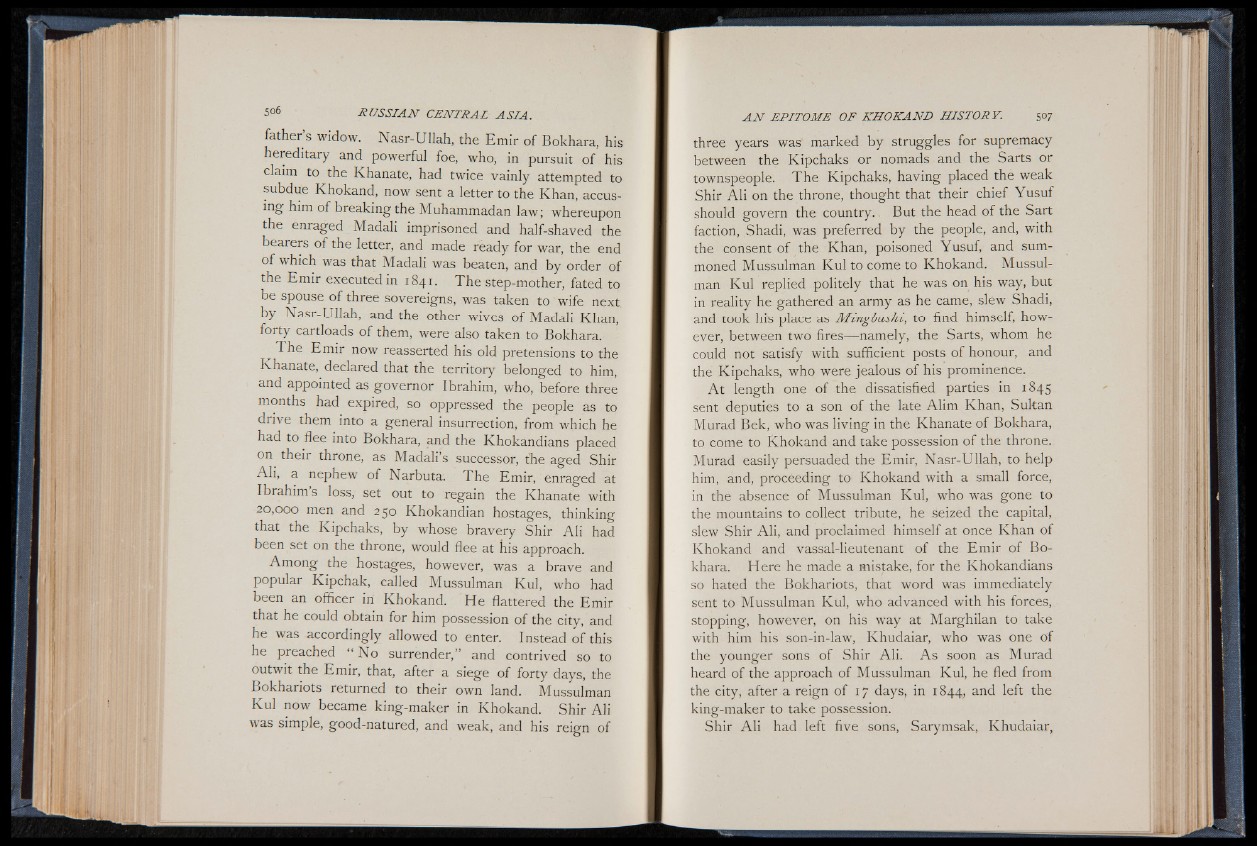
father’s widow. Nasr-Ullah, the Emir of Bokhara, his
hereditary and powerful foe, who, in pursuit of his
claim to the Khanate, had twice vainly attempted to
subdute Khokand, now sent a letter to the Khan, accusing
him of breaking the Muhammadan law; whereupon
the enraged Madali imprisoned and half-shaved the
bearers of the letter, and made ready for war, the end
of which was that Madali was beaten, and by order of
the Emir executed in 1841. The step-mother, fated to
be spouse of three sovereigns, was taken to wife next
by Nasr-Ullah, and the other wives of Madali Khan,
forty cartloads of them, were also taken to Bokhara.
The Emir now reasserted his old pretensions to the
Khanate, declared that the territory belonged to him,
and appointed as governor Ibrahim, who, before three
months had expired, so oppressed the people as to
drive them into a general insurrection, from which he
had to flee into Bokhara, and the Khokandians placed
on their throne, as Madali’s successor, the aged Shir
Ali, a nephew of Narbuta. The Emir, enraged at
Ibrahim’s loss, set out to regain the Khanate with
20,000 men and 250 Khokandian hostages, thinking
that the Kipchaks, by whose bravery Shir Ali had
been set on the throne, would flee at his approach.
Among the hostages, however, was a brave and
popular Kipchak, called Mussulman Kul, who had
been an officer in Khokand. He flattered the Emir
that he could obtain for him possession of the city, and
he was accordingly allowed to enter. Instead of this
he preached “ No surrender,” and contrived so to
outwit the Emir, that, after a siege of forty days, the
Bokhariots returned to their own land. Mussulman
Kul now became king-maker in Khokand. Shir Ali
was simple, good-natured, and weak, and his reign of
three years was marked by struggles for supremacy
between the Kipchaks or nomads and the Sarts or
townspeople. The Kipchaks, having placed the weak
Shir Ali on the throne, thought that their chief Yusuf
should govern the country., But the head of the Sart
faction, Shadi, was preferred by the people, and, with
the consent of the Khan, poisoned Yusuf, and summoned
Mussulman Kul to come to Khokand. Mussulman
Kul replied politely that he was on his way, but
in reality he gathered an army as he came, slew Shadi,
and took his place as Mingbashi, to find himself, however,
between two fires— namely, the Sarts, whom he
could not satisfy with sufficient posts of honour, and
the Kipchaks, who were jealous of his prominence.
A t length one of the dissatisfied parties in 1845
sent deputies to a son of the late Alim Khan, Sultan
Murad Bek, who was living in the Khanate of Bokhara,
to come to Khokand and take possession of the throne.
Murad easily persuaded the Emir, Nasr-Ullah, to help
him, and, proceeding to Khokand with a small force,
in the absence of Mussulman Kul, who was gone to
the mountains to collect tribute, he seized the capital,
slew Shir Ali, and proclaimed himself at once Khan of
Khokand and vassal-lieutenant of the Emir of Bokhara.
Here he made a mistake, for the Khokandians
so hated the Bokhariots, that word was immediately
sent to Mussulman Kul, who advanced with his forces,
stopping, however, on his way at Marghilan to take
with him his son-in-law, Khudaiar, who was one of
the younger sons of Shir Ali. As soon as Murad
heard of the approach of Mussulman Kul, he fled from
the city, after a reign of 17 days, in 1844, and left the
king-maker to take possession.
Shir Ali had left five sons, Sarymsak, Khudaiar,